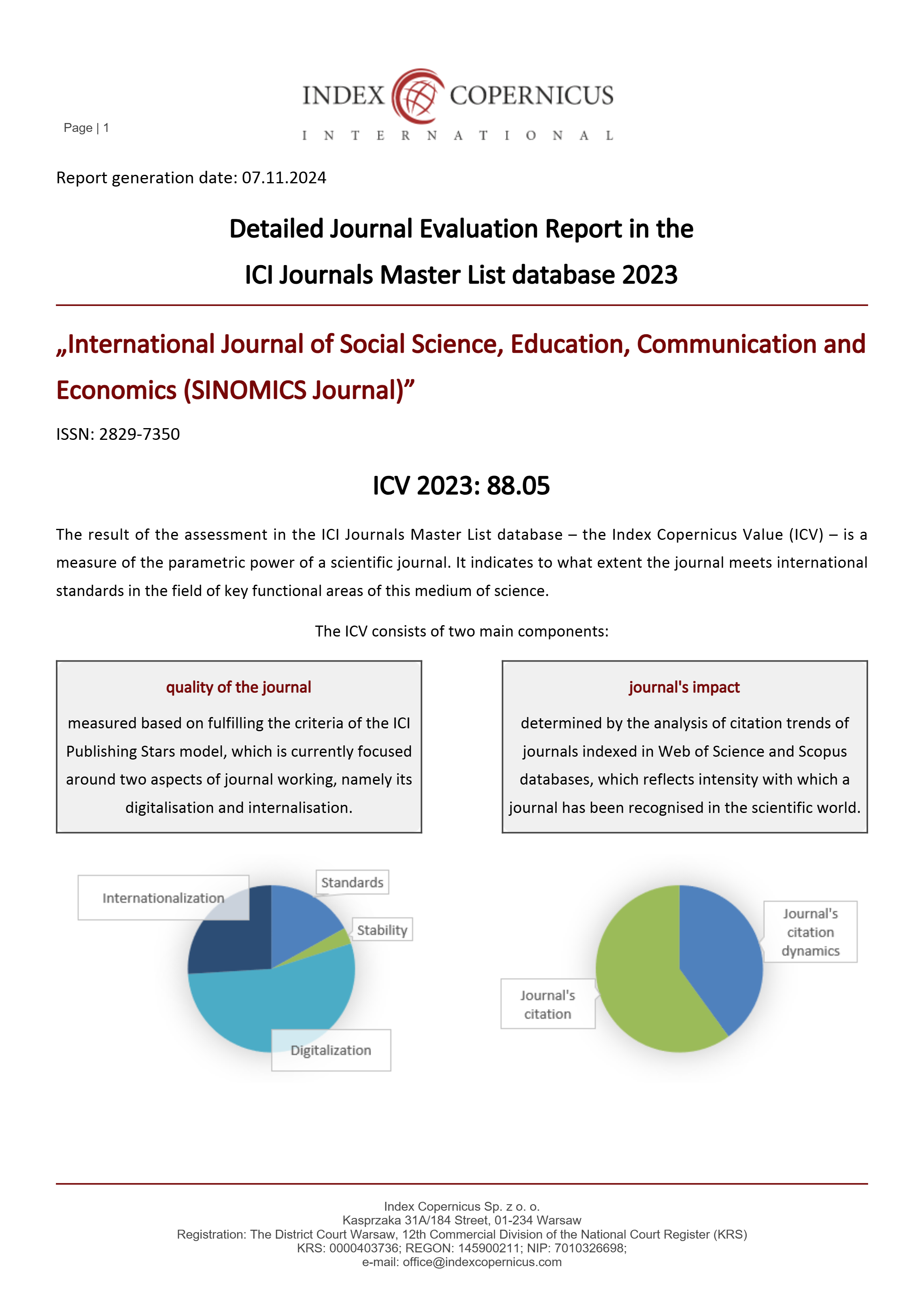Investigating the Role of Unemployment on Relationship Breakdown Among the Unemployed Ghanaian Youth
Main Article Content
Daitey William
Owusu Panin Kwame Baah
Takyi Eddy Mary
Ahiabu Selasi
Bonsu Emmanuel
This study examines the relationship between unemployment and relationship breakdown among youth in Ghana. Unemployment among youth has become a pressing issue globally, particularly in developing countries like Ghana. The objective is to investigate how the experience of unemployment influences relationship stability among young adults. The study employs qualitative research methods, including interviews and focus groups to gather data from unemployed youth in various regions of Ghana. Factors such as financial stress, decreased self-esteem, and the strain on interpersonal relationships due to unemployment were some of the perceptions by the unemployed youth in Ghana. The findings aim to contribute to a better understanding of the social impacts of unemployment and provide insights into potential interventions to support youth navigating these challenges in Ghanaian society.
Ajayi, S. I. (1979). Existence and Stability of Wage Unemployment Dilemma in a Developing Country: The Case of Ghana. Artha Vijnana: Journal of the Gokhale Institute of Politics and Economics, 21(2), 244. https://doi.org/10.21648/arthavij/1979/v21/i2/116551
Alfonsi, L., Bandiera, O., Bassi, V., Burgess, R., Rasul, I., Sulaiman, M., & Vitali, A. (2020). Tackling youth unemployment: Evidence from a labor market experiment in Uganda. Econometrica, 88(6), 2369-2414.
Amissah, C. M., & Nyarko, K. (2017). Psychological Effects of Youth Unemployment in Ghana. Journal of Social Sciences, 13(1), 64–77. https://doi.org/10.3844/jssp.2017.64.77
Ampong, E. (2020). Graduate Unemployment In Ghana: Challenges And Workable Strategies. International Journal of Research 57(1) https://doi.org/10.47119/ijrp100571720201344
Ayesu, E. (2011). Billboards, Youth, Unemployment and Superstition in Mamfe-Akuapem, Ghana. Journal of Asian and African Studies, 47(6), 634–651. https://doi.org/10.1177/0021909611427014
Baah-Boateng, W. (2013). Determinants of Unemployment in Ghana. African Development Review, 25(4), 385–399. https://doi.org/10.1111/1467-8268.12037
Brown, A. (2019). Qualitative Method and Compromise in Applied Social Research. Qualitative Research, 10(2), 229–248.
Campbell, S., Greenwood, M., Prior, S., Shearer, T., Walkem, K., Young, S., … Walker, K. (2020). Purposive Sampling: Complex or Simple? Research Case Examples. Journal of Research in Nursing, 25(8), 652–661. NCBI. Retrieved from NCBI.
Citinewsroom. (2024, February 21). Ghana’s unemployment rate hits 14.7 percent. Retrieved from Citinewsroom - Comprehensive News in Ghana website: https://citinewsroom.com/2024/02/ghanas-unemployment-rate-hits-14-7-percent/
Cohen, L. (1985). L. Manion, Research methods in education. Elsevier Publishers.
Conger, R. D., Ge, X., Elder, G. H., Lorenz, F. O., & Simons, R. L. (1994). Economic Stress, Coercive Family Process, and Developmental Problems of Adolescents. Child Development, 65(2), 541–561. https://doi.org/10.1111/j.1467-8624.1994.tb00768.x
Fakih, A., Haimoun, N., & Kassem, M. (2020). Youth unemployment, gender and institutions during transition: evidence from the Arab Spring. Social Indicators Research, 150, 311-336.
Gornall, L. (2011). Book Review: Mixed Method Design: Principles and Procedures. Qualitative Research, 11(4), 456–457. https://doi.org/10.1177/1468794111410781
Inanc, H. (2020). Breaking down the numbers: What does COVID-19 mean for youth unemployment. Mathematica Policy Research, 3, 1-22.
Joffe, H. (2011). Thematic analysis. Qualitative research methods in mental health and psychotherapy: A guide for students and practitioners, 209-223.
Kang, Y. (2021). Determinants of youth unemployment: empirical analysis of OECD and EU member countries in 2000-2017. Journal of Economic Development, 46(3), 109-131.
Kerpelman, J. L. (2001). Identity Control Theory, Exploration, and Choice: A Commentary on Schwartz’s “The Evolution of Eriksonian and Neo-Eriksonian Identity Theory and Research.” Identity, 1(1), 81–86. https://doi.org/10.1207/s1532706xkerpel
Korostelina, K. (2014). Intergroup Identity Insults: A Social Identity Theory Perspective. Identity, 14(3), 214–229. https://doi.org/10.1080/15283488.2014.921170
McGee, D. (2020). On the normalisation of online sports gambling among young adult men in the UK: a public health perspective. Public health, 184, 89-94.
Morrell, S., Taylor, R., Quine, S., Kerr, C., & Western, J. (1994). A cohort study of unemployment as a cause of psychological disturbance in Australian youth. Social science & medicine, 38(11), 1553-1564.
O'higgins, N. (2001). Youth unemployment and employment policy: A global perspective. O’Higgins, (2001).
Olubusoye, O. E., Salisu, A. A., & Olofin, S. O. (2023). Youth unemployment in Nigeria: nature, causes and solutions. Quality & Quantity, 57(2), 1125-1157.
Peel, R., & Caltabiano, N. (2021). Why do we sabotage love? A thematic analysis of lived experiences of relationship breakdown and maintenance. Journal of Couple & Relationship Therapy, 20(2), 99-131.
Rutter, J. (2022). Relationship breakdown. Civil Service-Ministerial Relations: Time for a Reset.
Simpson, B. (2020). Changing families: An ethnographic approach to divorce and separation.
Stack, S., & Wasserman, I. (2007). Economic Strain and Suicide Risk: A Qualitative Analysis.
Daitey William, AsanSka University College of Design and Technology, Ghana
Department of Product Design and Entrepreneurship, AsanSka University College of Design and Technology, Ghana
Owusu Panin Kwame Baah, AsanSka University College of Design and Technology, Ghana
Department of Jewellery Design, AsanSka University College of Design and Technology, Ghana
Takyi Eddy Mary, AsanSka University College of Design and Technology, Ghana
Department of Fashion Design, AsanSka University College of Design and Technology, Ghana
Ahiabu Selasi, AsanSka University College of Design and Technology, Ghana
Department of Digital Media and Communication Design, AsanSka University College of Design and Technology, Ghana
Bonsu Emmanuel, AsanSka University College of Design and Technology, Ghana
Department of Jewellery Design, AsanSka University College of Design and Technology, Ghana










